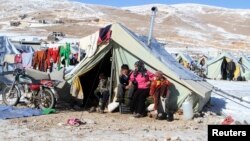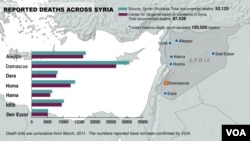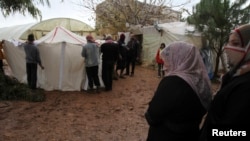BEIRUT —
U.N. agencies have had to reduce aid to Syrian refugees in Lebanon and those who get no food assistance say they are falling into deep debt.
With Syrians continuing to flood into Lebanon, U.N. agencies were hard-pressed to provide food assistance to refugees for most of last year. Twenty percent of registered refugees had their food aid cut off at the end of 2013 as the aid agencies decided they had to make tough choices.
Forty-year-old Um-Odai, who fled the Syrian city of Homs along with her husband and five children, says her family stopped receiving assistance and now they owe a lot of money. Her husband is too sick to try to find work and four of her children are very young; her oldest son also has a wife and a newborn.
One of her sons, she says, works as a day laborer and whenever he finds a job he can bring money to the lean-to they occupy in the northern Lebanese town of Tripoli. But they are in debt to many shops in the area and they do not know how they will repay what they owe.
She calculates they owe $2,000 after living in Lebanon for a year-and-half.
On average, every week 11,000 new Syrian refugees arrive in Lebanon and, and because an agreement at the Geneva II peace talks appears elusive, the flow of those fleeing Syria's civil war shows no sign of abating. If new arrivals continue at the current rate, a million Syrians will have registered as refugees in Lebanon by the beginning of next month.
The head of the U.N. refugee agency in Lebanon, Ninette Kelley, says the aid agencies have little choice but to focus on the neediest.
"We have always had to target our assistance to the most vulnerable," she said. "For most of last year blanket food assistance was provided to everybody who was registered, but this is not something that is a normal practice. But once you have more information you can further target your provision of food assistance according to vulnerability."
Last autumn, U.N. agencies undertook a vulnerability assessment of all registered Syrian refugees and concluded about 80 percent would have no other form of food support without international assistance.
"Which meant that there were 20 percent who had been receiving food who were notified that they would no longer receive it on a regular basis," Kelley said.
But Um-Odai says she does not understand why she and her family are among about a quarter of a million without food assistance.
She says the decision appears non-rational and she and her husband say they know other refugees in the makeshift camp in which they live near Tripoli's seaport, who are in the same position but are still receiving U.N. money to buy food.
Food assistance or not even those who receive U.N. food aid say life is getting harder and more expensive, and they too are falling into debt.
With Syrians continuing to flood into Lebanon, U.N. agencies were hard-pressed to provide food assistance to refugees for most of last year. Twenty percent of registered refugees had their food aid cut off at the end of 2013 as the aid agencies decided they had to make tough choices.
Forty-year-old Um-Odai, who fled the Syrian city of Homs along with her husband and five children, says her family stopped receiving assistance and now they owe a lot of money. Her husband is too sick to try to find work and four of her children are very young; her oldest son also has a wife and a newborn.
One of her sons, she says, works as a day laborer and whenever he finds a job he can bring money to the lean-to they occupy in the northern Lebanese town of Tripoli. But they are in debt to many shops in the area and they do not know how they will repay what they owe.
She calculates they owe $2,000 after living in Lebanon for a year-and-half.
On average, every week 11,000 new Syrian refugees arrive in Lebanon and, and because an agreement at the Geneva II peace talks appears elusive, the flow of those fleeing Syria's civil war shows no sign of abating. If new arrivals continue at the current rate, a million Syrians will have registered as refugees in Lebanon by the beginning of next month.
The head of the U.N. refugee agency in Lebanon, Ninette Kelley, says the aid agencies have little choice but to focus on the neediest.
"We have always had to target our assistance to the most vulnerable," she said. "For most of last year blanket food assistance was provided to everybody who was registered, but this is not something that is a normal practice. But once you have more information you can further target your provision of food assistance according to vulnerability."
Last autumn, U.N. agencies undertook a vulnerability assessment of all registered Syrian refugees and concluded about 80 percent would have no other form of food support without international assistance.
"Which meant that there were 20 percent who had been receiving food who were notified that they would no longer receive it on a regular basis," Kelley said.
But Um-Odai says she does not understand why she and her family are among about a quarter of a million without food assistance.
She says the decision appears non-rational and she and her husband say they know other refugees in the makeshift camp in which they live near Tripoli's seaport, who are in the same position but are still receiving U.N. money to buy food.
Food assistance or not even those who receive U.N. food aid say life is getting harder and more expensive, and they too are falling into debt.






